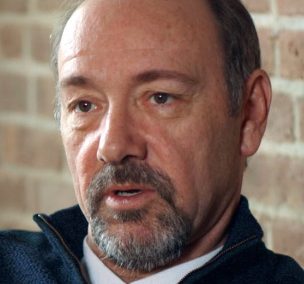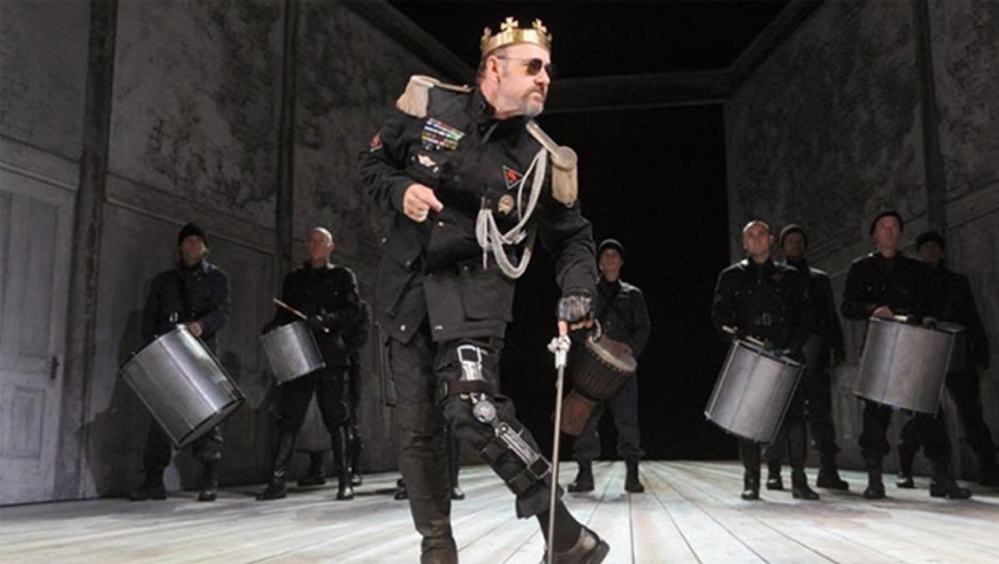LOS ANGELES — More than a decade ago, Kevin Spacey made what many in Hollywood considered a curious decision. In the midst of a thriving film career, on the heels of winning his second Oscar, Spacey moved to London to run an old theater.
It was a worthy endeavor – to participate in the revival of the Old Vic, a once-great 196-year-old institution where Olivier and Gielgud had performed – but one that would take the actor out of major box-office circulation for 10 years in his prime. Now 54 and perhaps best known for the power-hungry politician he plays on Netflix’s “House of Cards,” Spacey has executive produced and is self-distributing a documentary about his Old Vic days, called “Now: In the Wings on a World Stage.”
The actor said he hopes that the movie will help elucidate the career move that befuddled so many, even in his own circle.
“I made this movie for all those people who look at me like a puzzled dog,” he said. “Like, ‘Why did you go to London? Why theater? Why don’t you just do movies and be famous and have lots of money?’ For people who don’t get it, I made this movie for you.”
Spacey discussed what he calls his “disruptive” professional behavior in a genial interview recently in Beverly Hills, slipping occasionally into his Jack Lemmon and Bill Clinton impressions and a generic Valley Guy voice he deploys for mocking stupid people (“Like, don’t you get bored doing the same thing every night?”).
“Now,” which opened this month in L.A. and is also available to stream via Spacey’s website, chronicles a traveling production of Shakespeare’s “Richard III,” with Spacey in the title role and his “American Beauty” director, Sam Mendes, at the helm. First-time feature director Jeremy Whelehan followed the company of 20 British and American actors as they traveled from London to cities in Greece, China, Australia, the U.S. and the Middle East.
Theater critics called Spacey’s Richard III, one of Shakespeare’s most heartlessly ambitious characters, commanding and droll. In “Now,” cameras are backstage as the actor’s face beads with sweat before a performance, and he encases his leg in a splint to approximate Richard’s deformed body.
It was the prospect of that kind of electric live theater experience, Spacey said, that lured him to the Old Vic one rainy night after the London Film Festival premiere of “American Beauty” in 1999. The film, which had already opened in the U.S. and was in the process of becoming a hit, would win him his second Oscar (the first was for his performance as a master criminal in “The Usual Suspects”).
“My experiment to see if I could have a film career kind of had gone better than I could have hoped, and I was like, now what?” he said. “Everyone on my team was like, ‘Ooh it’s gravy train time now. Now we’re gonna cash in.’ And I was sort of determined that I didn’t want to end up in the trap that I had seen happen so many times where an actor just starts taking movies he shouldn’t do, making lots of money, being on those lists. I was like, I wanna do something else, something that’s challenging and outside of my own ambition and bigger than me.”
After being run by a Canadian department store entrepreneur in the 1980s, the Old Vic, in London’s Waterloo neighborhood, was at one point in the ’90s going to be turned into a discotheque (“I’m not against a disco season,” Spacey said). By 1999, it was in the hands of a charitable trust, which was looking for an artistic director. Spacey, who had performed “The Iceman Cometh” in London, was asked for help in selecting a candidate. Instead he decided to put his own hat in the ring, formally taking on the role in 2003.
OFF TO A ROUGH START
His early years were rocky. Charged with filling a 1,000-seat theater that receives no public funding, Spacey occasionally chose work critics thought unworthy of the theater. Amid a horrendously reviewed production of “Resurrection Blues,” a writer at the Evening Standard called for his resignation.
“How dare you not do Chekhov, Ibsen, Shakespeare, Shaw?” Spacey said, echoing critics’ comments. “We could take all of our critics and fill one row. We have to fill a lot of rows. … The first job we have to do is to get people into this theater. We have to do work that is exciting, diverse and that people might not expect on the Old Vic stage, and we have to reach out to a broader, more diverse and younger audience.”
Offstage, Spacey was spending most of his time fundraising, courting corporations and individuals and filing for grants to help maintain the building, with its Victorian plumbing and World War II-bombed roof. The Old Vic now has an American Airlines bar and offers cheap tickets to patrons under 25 thanks to sponsor subsidies.
“I had to push my fundraising staff because there’s a kind of polite British thing,” he said, slipping into a fey whisper, “‘Oh we don’t want to upset them, so we thought we’d just ask for $5,000.’ Don’t ask for $5,000, ask for $25,000. … You have to be willing to be aggressive, to be direct. And I’ve never had a problem with that.”
As the years ticked by, British critics eventually warmed to Spacey, particularly his 2011 Richard III. It’s a role that fans who know Spacey for his “House of Cards” persona will find familiar; Michael Dobbs, the novelist whose work the show is based upon, has said Richard III was an inspiration.
“Although some people believe that Ferris Bueller created the direct address, it actually was William Shakespeare and it actually was in this play,” Spacey said. “They’re both characters that are willing to do whatever is necessary to get ahead … and they’re both characters who are remarkable at predicting how people will react to something. That means that both of them are able to be about 16 moves ahead in the chess game.”
In releasing the documentary himself, under the banner Spacey LTD, the actor said he is taking control of a project that’s precious to him. “I honestly believe that the industry undervalues films like this,” he said. “They slot them in a little niche, ‘Oh that’s for a very small audience.’ Maybe there’s a bigger audience for this than anyone might expect.”
Spacey declined to disclose a budget for the documentary, but the actor, who has been busy doing lucrative voice work, including in a new “Call of Duty” video game and several commercials, doesn’t seem concerned about money.
“It wasn’t astronomical, but it wasn’t cheap,” he said. “If I make my money back, great. If I don’t I’m still happy I’ve done it. I’ll make it up somewhere else, ‘cause you know I’ve replaced the E-Trade baby. “
Beginning later this month, Spacey will play Clarence Darrow in a one-man show at the Old Vic, as he moves toward winding down his artistic director role there in 2015. Later this year he’ll start production on the third season of “House of Cards” and appear in the comedy “Horrible Bosses 2.”
Reflecting on his guiding principle professionally, Spacey borrowed an anecdote from the set of the 1964 John Huston film “Night of the Iguana.” Asked, at a dinner on the beach in Mexico, to describe in one word what was most important in life, Huston supposedly said, “interest.”
“To stay interested,” Spacey said. “And that’s what I can say I am most happy about, is that I am interested, still.”
Send questions/comments to the editors.




Success. Please wait for the page to reload. If the page does not reload within 5 seconds, please refresh the page.
Enter your email and password to access comments.
Hi, to comment on stories you must . This profile is in addition to your subscription and website login.
Already have a commenting profile? .
Invalid username/password.
Please check your email to confirm and complete your registration.
Only subscribers are eligible to post comments. Please subscribe or login first for digital access. Here’s why.
Use the form below to reset your password. When you've submitted your account email, we will send an email with a reset code.